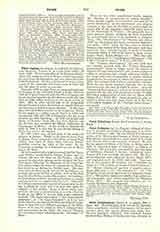

Peter Cantor, theologian, b. probably at Gisberoi, near Beauvais, France; d. at Long Pont Abbey, September 22, 1197. He was a member of the Hosdenc family; when still young he went to Reims, which may possibly have been his birthplace, and was educated at the cathedral school. He was a professor for many years, canon of the cathedral, and would seem to have had also the office of cantor or succentor.
Towards 1170, we find Peter as canon and professor of theology of the cathedral school at Paris, where in 1180 he is again invested with the office of cantor, for his predecessor, appears on the documents for the last time in 1180, whilst mention is first made of him in 1184. This is what caused him to be designated Petrus Cantor, Cantor Parisiensis, or simply Cantor; and his name is found on many charters. At the same time, his capabilities led him to be frequently chosen by the popes as a judge, e.g., at Troyes in 1188, and also during 1196 and 1197 at Compiegne for the royal divorce case with Ingeberge. In 1191 the people and clergy of Tournai chose him for their bishop, but his election was annulled by Bishop Guillaume de Champagne of Reims. At the death of Maurice de Sully in 1196, it is said that he was elected Bishop of Paris, but refused the dignity.
In 1196 Peter was elected dean of the cathedral chapter of Reims. Whilst on his journey from Paris to Reims, Peter visited the Cistercians at Long Pont Abbey, was taken ill there, died, and was buried, probably wearing the habit of the order. In the Cistercian menology he is honored as one of themselves (May 19).
He left commentaries or glosses on all the Old Testament Books, except Judith, Esther, Tobias, and Leviticus; the best are those on the Psalms. In like manner he also wrote glosses on the whole of the New Testament, following the Harmony of the Four Gospels which, under the name of Ammonius, or Tatian, was much in use during the Middle Ages. His commentaries on the Gospels and on the Apocalypse are perhaps the most worthy of praise; that on St. Paul may be described as an interlinear gloss; in it scholastic discussions are often introduced apropos of certain subjects as they are suggested by the text. This style of writing commentaries was by no means new to the age in which he lived, and it is more and more developed at this period. None of these works were printed, not even an introduction or treatise which he wrote on the Bible in twenty folio pages variously entitled: “De tropis theologicis”, “De contrarietate scripturae”, or “De tropis loquendi”; in it he lays down rules for the solution of contradictions that may seem to exist between different passages of the Bible. Traces of it may be found in Peter’s commentaries and annotations on the Bible; the rules of Ticonius are sometimes found following on the “De tropis” of Peter.
There are two other unpublished works, namely, the “Summa de sacramentis et anima? consiliis”, which though lengthy is nevertheless precious for its varied information on the institutions and religious customs of the time; he develops at great length the moral side of the question, especially when writing on the Sacrament of Penance. He purposely leaves aside matters already discussed by Peter Lombard, for as he himself says it is his intention to complete them. The “Distinctiones” or “Summa quae dicitur Abel” is a theological dictionary arranged in alphabetical order, “Abel” being the first word, in which is found a short resume of the ideas, doctrines, and theories of the time; with this as title, he wrote a valuable document which is still to be found in many manuscripts (Paris, Rome, Bruges, etc.). Pitra has published portions of it (“Spicilegium Solesmense”, III, I, 308; “Analecta Sacra,” II, 6-154, 585-628).
The “Verbum Abbreviatum”, his only work that was entirely printed, with the “Contra Monachos proprietarios” which in Migne forms the matter of chapter cliii and written before 1187, is not a course of ethics or asceticism, but a book addressed chiefly to the clergy and more in particular to monks, wherein he exhorts to the practice of virtue; his sources are the Bible, the writings of the Fathers, and profane authors. What he says about manners, customs, etc., is very instructive for the time in which he wrote. As in the “Summa de Sacramentis”, so here are found scholastic theories side by side with practical remarks on daily life from a religious point of view (Ist ed., Mons, 1639; Migne, P.L., CCV, 23). Some sermons are also ascribed to Peter, but only those which are in the form of detached chapters of the “Verbum abbreviatum” are known.
J. DE GHELLINCK

